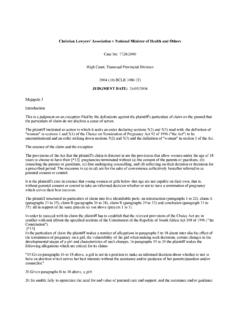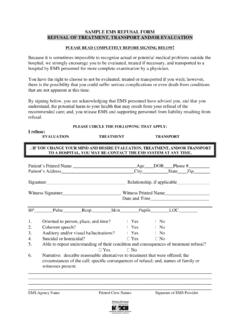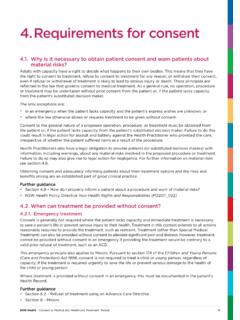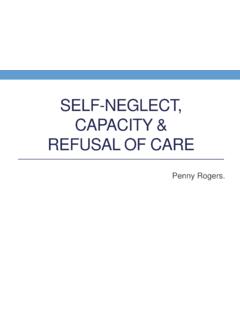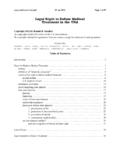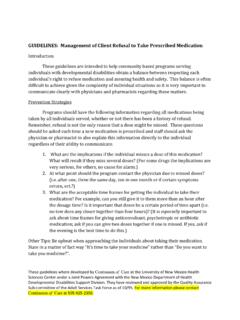Transcription of Re T (adult refusal of medical treatment)
1 [1992] 4 All ER 649 Re T (adult: refusal of medical treatment ) Court of Appeal, Civil Division LORD DONALDSON OF LYMINGTON MR, BUTLER-SLOSS AND STAUGHTON LJJ 22, 23, 24, 30 JULY 1992 James Munby QC and Christopher Butler (instructed by the Official Solicitor) for T. David Stembridge QC and Stephen Oliver-Jones (instructed by A V S Lewington, Birmingham) for the two health authorities. Allan Levy QC and Peter Rank (instructed by Smith Partnership, Stoke-on-Trent) for T's father. Richard Daniel (instructed by Hatchett Jones & Kidgell) for T's mother, who appeared only on 30 July.
2 At the conclusion of the argument their Lordship's stated that they would give their decision on 24 July 1992 and their reasons therefor on a later date. 24 July 1992. The court announced that the appeal would be dismissed. 30 July 1992. The following judgments were delivered. LORD DONALDSON OF LYMINGTON MR. This appeal is not in truth about the 'right to die'. There is no suggestion that Miss T wants to die. I do not doubt that she wants to live and we all hope that she will. This appeal is about the 'right to choose how to live'. This is quite different, even if the choice, when made, may make an early death more likely.
3 It is also about whether Miss T really did choose and, if so, what choice she made. The public importance of these questions cannot be doubted but this is nothing to do with Miss T as a private individual. She is unconscious and her privacy should be respected. Those who are looking after her have a difficult task and it should not be made more difficult by being harassed by requests for information. Miss T being an adult, it is doubtful whether we have power to make a restraining order of the kind which is often made in the case of children whose medical treatment is in issue before the courts, but I hope and believe that it is in any event unnecessary.
4 The right to choose In recent months we have had to review the law in relation to the medical treatment of children (see Re R (a minor) (wardship: medical treatment ) [1991] 4 All ER 177, [1992] Fam 11 and Re J (a minor) ( medical treatment ) [1992] 4 All ER 614. These decisions have no application to adult patients. An adult patient who, like Miss T, suffers from no mental incapacity has an absolute right to choose whether [1992] 4 All ER 649 at 653 to consent to medical treatment , to refuse it or to choose one rather than another of the treatments being offered.)
5 The only possible qualification is a case in which the choice may lead to the death of a viable foetus. That is not this case and, if and when it arises, the courts will be faced with a novel problem of considerable legal and ethical complexity. This right of choice is not limited to decisions which others might regard as sensible. It exists notwithstanding that the reasons for making the choice are rational, irrational, unknown or even non-existent (see Sidaway v Bethlem Royal Hospital Governors [1985] 1 All ER 643 at 666, [1985] AC 871 at 904 905).
6 But just because adults have the right to choose, it does not follow that they have in fact exercised that right. Determining whether or not they have done so is a quite different and sometimes difficult matter. And if it is clear that they have exercised their right of choice, problems can still arise in determining what precisely they have chosen. This appeal illustrates both these problems. The role of consent The law requires that an adult patient who is mentally and physically capable of exercising a choice must consent if medical treatment of him is to be lawful, although the consent need not be in writing and may sometimes be inferred from the patient's conduct in the context of the surrounding circumstances.
7 Treating him without his consent or despite a refusal of consent will constitute the civil wrong of trespass to the person and may constitute a crime. If, however, the patient has made no choice and, when the need for treatment arises, is in no position to make one, eg the classic emergency situation with an unconscious patient, the practitioner can lawfully treat the patient in accordance with his clinical judgment of what is in the patient's best interest. There seems to be a view in the medical profession that in such emergency circumstances the next of kin should be asked to consent on behalf of the patient and that, if possible, treatment should be postponed until that consent has been obtained.
8 This is a misconception because the next of kin has no legal right either to consent or to refuse consent. This is not to say that it is an undesirable practice if the interests of the patient will not be adversely affected by any consequential delay. I say this because contact with the next of kin may reveal that the patient has made an anticipatory choice which, if clearly established and applicable in the circumstances two major 'ifs' would bind the practitioner. Consultation with the next of kin has a further advantage in that it may reveal information as to the personal circumstances of the patient and as to the choice which the patient might have made, if he or she had been in a position to make it.
9 Neither the personal circumstances of the patient nor a speculative answer to the question 'What would the patient have chosen?' can bind the practitioner in his choice of whether or not to treat or how to treat or justify him in acting contrary to a clearly established anticipatory refusal to accept treatment but they are factors to be taken into account by him in forming a clinical judgment as to what is in the best interests of the patient. For example, if he learnt that the patient was a Jehovah's Witness, but had had no evidence of a refusal to accept blood transfusions, he would avoid or postpone any blood transfusion so long as possible.
10 Miss T's history Miss T's parents separated in 1975 when she was three years old. No doubt there were many reasons, but one was undoubtedly the fact that, whereas Mrs T was a fervent Jehovah's Witness, Mr T emphatically rejected that faith. Initially Miss T continued to live with her father, but six months later she was removed by her mother without her father's consent. In the ensuing proceedings custody [1992] 4 All ER 649 at 654 of Miss T was granted to her mother, which is not altogether surprising as she was still very young and was a girl. However the custody order expressly forbade Miss T being brought up as a Jehovah's Witness, the intention being that she should make her own decision when she was old enough to do so.

